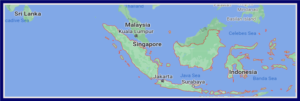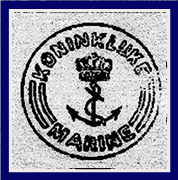
DUTCH INDONESIAN MEMOIRS 1941 - 1948
MLD Marine Luchtvaart Dienst
or
DNAS Dutch Naval Air Service
KONINKLIJKE LUCHTMACHT Netherlands Royal Air Force
HANGER 6 Naval Airstation Morokrembangan
Page 2. A Last Meal, Exodus & Ten days in enemy waters
WORLD AT WAR
7 December 1941, Japanese attack Pearl Harbour and Midway. Canada declares war on Japan. On same day.
(Dec. 8, Far Eastern time), Japanese strike at Wake, Guam, Philippines, British Malaya, Hong Kong, invade Thailand. Netherlands Indies declares war on Japan.
8 December 1941, United States and Britain declare war on Japan.
9 December 1941, China declares war on Japan, Germany, Italy. Thailand surrenders to Japan.
10 December 1941, Japanese planes sink British ships off Malaya. Land on Luzon in the Philippines.
11 December 1941, United States declares war on Germany, Italy. Germany, Italy declares war on United States. Japanese occupy Guam.
12 December 1941, Japanese invade Burma from Thailand.
13 December 1941, Japanese invade Borneo.
23 December 1941, Wake Island surrenders to Japanese.
25 December 1941, Hong Kong falls to Japanese.
11 January 1942, Japanese Eastern Force land at five places on Celebes (Sulawesi) . Central Force land at Tarakan, East Kalimantan (Borneo)
20 January 1942, Central Force land at Balikpapan, South Kalimantan (Borneo)
23 January 1942, Balikpapan falls and Eastern Force take largest Dutch airfield outside of Holland at Kendari, Celebes
30 January 1942, Central Force set of to capture Banjermasin Central Kalimantan (Borneo)
9 February 1942, Makassar (Ujung Padang) Celebes falls to Eastern Force.
10 February 1942, Control Banjermasin airfield gain air cover for the Java Sea and Banka Strait.
11 February 1942, Japanese Western Force leaves Cam Ranh Bay Vietnam for Sumatra.
12 February 1942, Dutch Admiral Doorman leads combined naval force to attack Western Force. Retreats due to carrier borne air attacks.
12 February 1942, Eastern Force starts bombing campaign that lasts for six days on Timor.
14 February 1942, Western Force land on Banka Island and take Muntok airfield Sumatra.
15 February 1942, Western Force link up with 700 paratroopers outside Palembang. Japanese capture Singapore.
16 February 1942, Palembang falls with its oilfields intact.
18 February 1942, Second wave of invasion sets sail from Cam Rahn Bay for Java. Consists of 56 transport ships.
19 February 1942, Eastern Force bombs Darwin from Kendari and four carriers.
19 February 1942, Battle of Lombock Strait. Small Dutch and allied naval force attack Bali invasion Lose 1 Dutch destroyer 1 light cruiser damaged. Japanese had already landed.
20 February 1942, Eastern Force land on Timor and paratroopers attack Penfui airfield. Bali and its airfield at Den Passar fall.
27 February 1942, US carrier Langley sunk with all planes.
27 February to 1 March 1942,
Battle of the Java Sea.
Japanese Eastern Force destined for Kragan, Java consisted of 41 transports, 2 heavy cruisers, 2 light cruisers, 14 destroyers, air squadrons from Kendar and Borneo.
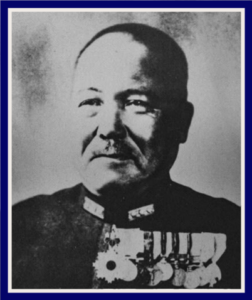
Admiral Takagi Takeo
Dutch, American, British, Australian, consisted of, 4 cruisers, 12 mixed destroyers, no air cover as the US Langley had gone down.
The allies lost four destroyers and the two Dutch cruisers Java and Rear Admiral Karel Doorman's' flagship the De Ruyter which he went down with.
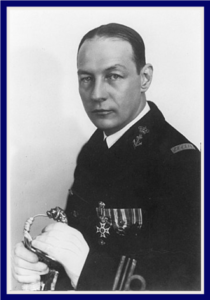
Rear-Admiral
Karl W.F.M. Doorman
28 February 1942, Allied cruisers Perth and Houston sunk attacking Western Force at Merak.
28 February 1942, Heavy cruiser HMS Exeter and two destroyers the USS Houston and HMAS Perth sunk on route from Surabaya to Freemantle.
Out of an entire fleet in operating in the Dutch East Indies during this period only four US destroyers escaped. They were the US Alden, Ford, Edwards and Paul Jones.
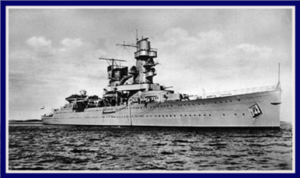
HRMS De Ruyte
2 March 1942, Kota Baroe leaves Tjilaplap. Sets course for Australia.
3 March 1942, Japan launches surprise air attack on Darwin North Australia.
5 March 1942, Japanese capture Indonesian capital, Batavia (Jakarta)
7 March 1942, Japanese Commander in Chief demands talks with Dutch C in C and the Governor General.
8 March 1942, Under threat of the devastating bombardment of Bandung unconditional surrender was agreed.
9 March 1942, Japanese enter Rangoon Burma. Vacated by British earlier.
11 March 1942, Japanese land on Mindanao. Southernmost island in the Philippines.
14 March 1942, Japanese troops land on Solomon Islands. Airfield built on Guadalcanal. Greater threat to Australia. American forces at Manila Bay threatened so retreat to Corregador.
17 March 1942, Retreating US General Doulas MacArthur arrives in Australia from Philippines.
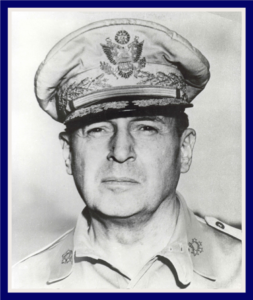
General Douglas MacArthur
December 7, 1941, Pearl Harbour was attacked and the Netherlands already was at war with Japan and Franks unit went on full alert, no more liberty out of town and restricted to eight o'clock in the evening on Saturdays and Sundays only. Frank wrote his parents that he could not come home until further notice and that all leaves had been cancelled.
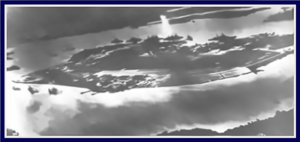
Pearl Harbour first torpedo hits at 8.00 am.
One day they were ordered to pack all their gear and were transported by bus and truck to a sugar factory near Pasuruan, a non-strategic town east of Surabaya. The move must have been planned ahead, as everything was there ready for them, dormitory, mess hall, rec.-room, even sick bay and some of their instructors. There were even civilian tailors and Frank ordered his first tailor made dress uniforms. Still the whole gravity of the situation had not sunk in.
"I think it was because we were so young. We did not know anything about the world situation. There was no TV then and no radio. Beside that we were kept in a sort of protective environment, maybe to prevent panic. After all most of us were only sixteen or not yet sixteen. My sixteenth birthday went by unnoticed by anyone, no letter from home or anything".
Franks buddy from the old gang had switchboard duty one evening and he secretly tried to make connection with his folks who had a telephone. After a few tries he got through. He could not tell them where we were, only that they were safe and hopefully they would be home at Easter. What he did not know at the time was what year that would be.
Soon after rumours that the naval base at Surabaya, and the naval air station had been bombed, several ships sunk, and twelve seaplanes destroyed.
"We did not realise what predicament we were in but I am sure now that the older people like our master at arms a marine sergeant, the instructors and the few officers that were with us knew exactly what was going on. They were all married, and their wives and families were in Surabaya, but they did a good job hiding it from us."
In the meantime, the battle in the Pacific went on and the Japanese forces advanced relentlessly. One by one the British and French strongholds collapsed, and Singapore and Malaysia were on the brink of collapsing, The Japanese forces were getting closer and closer.
One night they were told that all of them were going on liberty to a party and everybody went including all the senior personnel plus a couple of marine petty officers and navy petty officers. They all poured into three busses and took off to Pasuruan to some kind of private club building or social hall.
They sat around in-groups of four or more and ordering food and refreshments from the waiters and started to have a good time when Frank noticed something strange going on.
"All the senior personnel started to get into beer and gin, and pretty soon were pretty happy and started to sing and even offered some of us apprentices some beer. I knew that alcoholic beverages were strictly forbidden for us and here we were offered some and pretty soon could order beer our self, and it didn't take long before the majority of us were drunk and started to sing or passed out".
Time came to go back to camp and the men and boys all piled into the busses again. Someone mentioned to Frank something about a fight and Frank heard somebody shouting at the bus entrance: "Where in the hell are you".
"It was pitch dark in the bus due to the black out, and thinking that it was my buddy I replied:
"Here damned....,,
That was all I remembered. I blacked out and woke up the next morning in the sickbay with four stitches in my upper lip and unable to eat. My face and head hurt as it had never hurt before I must have suffered a hangover, too. I was the only patient and the corpsman that was looking after me was also nursing a hangover. What happened was that the guy who was in the fight was the same guy who shouted at the door, and when he heard my reply he swung his gas mask at me, thinking I was the guy he had the fight with, and hit me in the face. That wouldn't be so bad but the fact was that our gas masks were of the German type and you carried them around in a cylindrical steel container about five inches in diameter and ten inches long! Needless to say, the hit put me out cold.
Later that day the guy came over and visited me and apologised, said he was drunk and didn't know who it was he hit. I said it was all right and we shook hands and forgot about it. We were never put on report. That was also strange, as fighting in the navy especially between members of the same unit was enough to send you to the brig for at least six days. I heard that more than a few fellows got drunk that night and were not too happy the next day, including me. This was the first time in my life that I got drunk, and I felt awful with a split lip and a splitting headache".
It was not long afterwards they were awakened around three o'clock in the morning, given thirty minutes, to get dressed, pack up all their gear and fall in outside. Nobody seemed to know what was going on, but just did what was said. Now loaded in trucks they drove to a waiting train which contained only military personnel apart from as Frank noticed their marine sergeant and corporals.
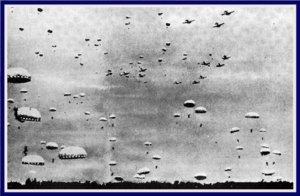
February 1942 Japanese Paratroopers land at Pelambang
Rumours now started to get around that Surabaya was bombed and that the naval base and the air station were laid flat also that their own demolition troops had started to raze all military facilities. Only by watching the stations had he an idea that the train was heading through central Java towards Jogjakarta and the south coast.
It finally arrived at the small harbour town of Tjilatjap (Cilacap) and shuttled to a dock where several freighters were moored and next to a Dutch coastal freighter the "Kota Baroe".
"Here we were told to get on board and find ourselves a place to sleep. This was the beginning of the end, and a heavy feeling came over me, which I could not share with anybody. Once again, I was on my own with no parents to turn to for support or comfort".
It was the first week of March 1942.
"After we boarded, we were told to line up for food. It was a bowl of rice with some kind of a meat stew. I don't know what it was exactly, but I was hungry, and it was filling having only had a few snacks we bought from vendors on the stations where we stopped. There was a freshwater faucet on deck, and we could get water there. It was utter chaos, and nobody knew what was going on.
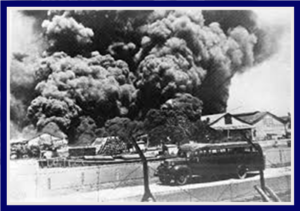
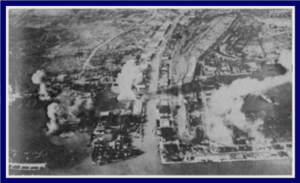
Allies destroy ammo dumps in Surabaya. Japanese bomb Surabaya naval base.
More naval units came on board, also a class of midshipmen from the naval academy. Now we heard that it was true, the naval base at Surabaya was destroyed and heavy losses were encountered by the allied forces and that the Japanese army already had landed on Bali and Ceribon. I found a place to sleep on the rear deck. It was nice and cool and in the shade of the second deck above us. There must have been several hundred men on board this small tub and hardly any place to sleep bodies everywhere. The cargo holds were full of people and the covers left open for fresh air, yet the air was suffocating.
It was late afternoon March 2, 1942, and we cast off, destination Australia was what the rumour mill said, and I saw at night, that we were heading with the Southern Cross over our starboard bow. The next day we were lying dead in the water, and nobody knew what the reason was. Rumours galore, lookouts were posted on port and starboard bow, the stern and on the bridge, to look out for periscopes and scan the horizon. We just drifted around aimlessly, and word got around that we had engine trouble.
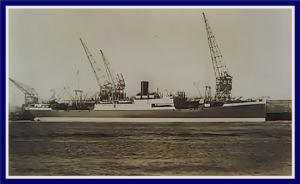
The Kota Baroe max speed 14 knots
Rumours were that all the other ships of our convoy were intercepted by the Japanese navy and were now heading for the island of Celebes (now Sulawesi)
Later at night we heard the engines start up again and felt the ship moving and we sailed in total "black out". In the morning I noticed that we were heading in an entirely different course. The sun was behind us over starboard side so we must be sailing in north-westerly direction which later changed in more westerly direction. I just watched the shadows on deck and was wondering where we were heading for. My father had taught me as a young boy how to read the compass and find my way in the woods without it, by just watching the sun by day, and the stars at night. The main constellation was the Southern Cross and on the open sea I figured it was not much different.
This was not exactly a pleasure cruise as the ship was only a small coastal freighter over-loaded with people. The second day we ran out of food and fresh water and meals were rationed to two slices of bread in the morning and evening and one slice for lunch and two cups of fresh water a day. It was a mess everywhere you looked. We never saw the crew of the ship as they kept to their own and we were not allowed into their quarters. The rumour mill stopped, and nobody knew where we were heading. It was kind of an apathy that settled over the ship. All we did was stare at the horizon not knowing what to expect.
One day I saw three guys being led on deck by an armed midshipman. They were hauling two tubs and a bunch of laundry and started to do the laundry with salt water and saltwater soap. The three guys washed and scrubbed sheets and clothes from breakfast to dinner, until their fingers were raw and bleeding. They ate and slept by their tubs, the first night tied to the railing. It was said that they were caught stealing rations out of the lifeboats. In the old days that would have meant a death sentence.
We had learned that the Netherlands East Indies had capitulated and that we were now drifting somewhere at sea with a destination only the captain of the ship knew. I realised now that we were not to be home for a long time. We must have stayed well out of sight of land, as we didn't even see birds. The food was getting worse and sometimes when you waited too long to stand in line there was nothing left, not even a crust of bread.
I had found a place on deck where I could sleep and was not about to let it go, the guy next to me and I took turns going away in order to keep our spot. It was on the rear deck under the super structure and in the shade during the day and out of the wind at night. It was in a corner against a bulkhead, on starboard side and at night I could see Southern Cross almost dead astern, so we were still moving north and westerly.
We were now about ten days at sea, and I felt a very depressed feeling coming over me and I hardly moved from my spot only for food and to go to the bathroom. Then one day around noon I saw an aeroplane approaching from the north, and everybody panicked. The two machine guns on the bridge deck were manned with midshipmen and the rear deck gun was manned by the ship's crew. When the plane came nearer, I noticed that it was a biplane but could not see the identification marks. Soon we noticed that it was a British navy plane. The plane made one pass, circled around, and wiggled its wings and disappeared over the horizon. Not long afterwards we saw a warship on the horizon and again everybody panicked. It was one of the heavy cruiser classes and soon we saw the signal lamp going. There was a signalman standing next to me who said they asked us for identification. He spoke enough English to decipher the message and then continued that it was our escort into port."

The Tjibadak
Soon they sighted land and by early evening sailed into port and moored alongside a passenger ship newly converted to a troopship. The "Tjibadak" which was also a Dutch merchant ship, the navy had used as a transit ship for stragglers fleeing Indonesia. The men were transferred to their new quarters and told they could take a shower and get ready for a meal. This was the first decent meal since leaving Indonesia ten days ago.
The port was Colombo on the island of Ceylon (Sri Lanka).
